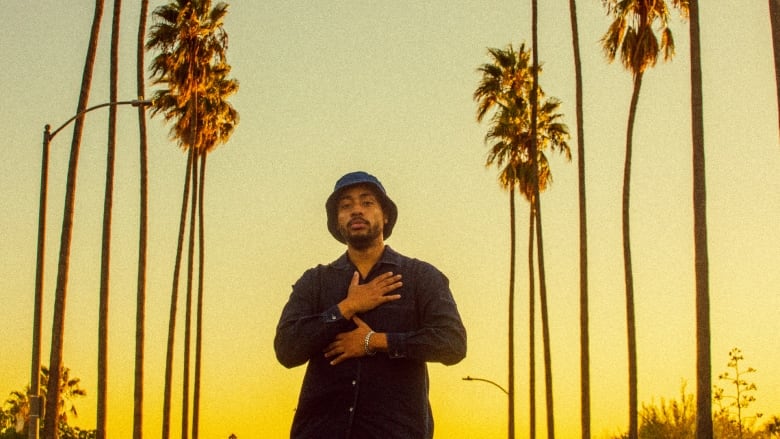Edmonton rapper Cadence Weapon says he's putting art before money
Cadence Weapon says after two decades, people are finally taking him seriously
Canadian hip-hop artist and poet Rollie Pemberton isn't taking his newfound sense of empowerment lightly.
After nearly two decades in the underground music scene, it took winning the 2021 Polaris Music Prize for the album Parallel World, under his stage name Cadence Weapon, before he felt people were truly starting to take him seriously.
Half a year out from that win, the lingering notion he once had of being seen only as a rapper or Black artist is gone. More people seem to consider him a 'public figure' now, he says, one who can speak truth to Canadian politics, racial profiling and an array of other important topics.
"It really emboldens me," he says of how the change is influencing his new music.
"It makes me want to push the boundaries in a different way than I did before."
In the middle of a winter thaw, Pemberton is sitting on a park bench in northwest Toronto looking to the future while trying to keep his flawless new pair of Yeezy sneakers out of slushy puddles.
A few days from now he'll fly to sunnier Los Angeles to record the followup to his Polaris-winning album, which will explore society on the verge of being swallowed by the metaverse.

If you don't listen to hip-hop music or haven't heard of Cadence Weapon, Pemberton hopes to change that very soon.
He'll publish a book in the spring that pays tribute to his eclectic musical roots and he's entertained the possibility of one day running for political office. Back in 2009, he began a two-year term as poet laureate for his hometown of Edmonton.
He boldly names Stevie Wonder, David Bowie and David Byrne as a few of the multifaceted artists who inspire him.
At 36, Pemberton displays a clear-eyed perspective around his goals after a tumultuous early career that included falling out with his label and recent against-the-odds resurgence in his career.
In 2005, Cadence Weapon arrived on the rap scene with the critically acclaimed Breaking Kayfabe, the first of his three Polaris shortlisted albums.

But in the years that followed, the relationship with his independent label Upper Class Recordings went south, with Pemberton alleging they pocketed the honorarium he earned as poet laureate and left him pleading for them to cut a cheque to pay his rent.
By 2015, he says the label had stopped answering his emails and effectively ceased operations. He's been trying to recover the rights to his albums ever since.
A request for comment was submitted on Thursday via his former label's website — where the most recent post is dated August 2019. The messages went unanswered.
'I always think art first'
None of this seems to have left him cynical, but it certainly colours much of his motivation, including how he uses his platform today. For instance, he says he won't sell his integrity to shill for most commercial goods.
"I don't want to do a liquor sponsorship or anything that's a harmful product," he says as an example.
"I never do anything that goes against my values."
He returns to the idea of artistic purity a few times, naming rapper Chuck D and late spoken-word poet Gil Scott-Heron as two public figures he respects for not "trying to make as much money as possible while they're alive."
"That's not really part of my whole artistic discipline," he adds. "I really don't care about money. I always think art first."
Parallel World holds that truth close to its centre. Written by Pemberton as he witnessed the George Floyd protests of 2020, the album is unwavering in how it offers a Canadian perspective on policing, gentrification and this country's history, all against pounding electronic beats.
Upcoming projects
A deluxe edition set for release Friday builds on the existing 10 tracks with six remixes that inject new energy into each verse.
There's an electronic rework of Connect by Grammy-nominated Montreal producer CFCF and a low-key jazz spin on Play No Games from Juno-nominated Toronto musician Harrison.
Pemberton says he views the expanded version as a creative segue to his next album, which will lean into hyperpop — a high-strung subgenre that rose from SoundCloud and is characterized by pounding beats and glitchy electronic elements.

Before that's finished, he'll follow up his 2014 poetry collection Magnetic Days, which captured a sliver of Canadian youth culture at the time, with a new book.
Bedroom Rapper: Cadence Weapon on Hip-Hop, Resistance, and Surviving the Music Industry is what he describes as a collection of stories and essays that pay tribute to the Canadian music scenes he's inhabited over the years. It's set for release on May 31.
In it, he considers Canada's oft-ignored underground music culture, from the Prairies rap scene to Montreal's loft parties, committing stories and essays to the page about artists who influenced him but never really got their due.
"I was around in a pre-Drake environment [when] the idea of a Canadian rapper to the outside world was comical," he said.
"I always have felt like an outsider. I used to be kind of bummed about it. But now I love it. Because I just do what I want."